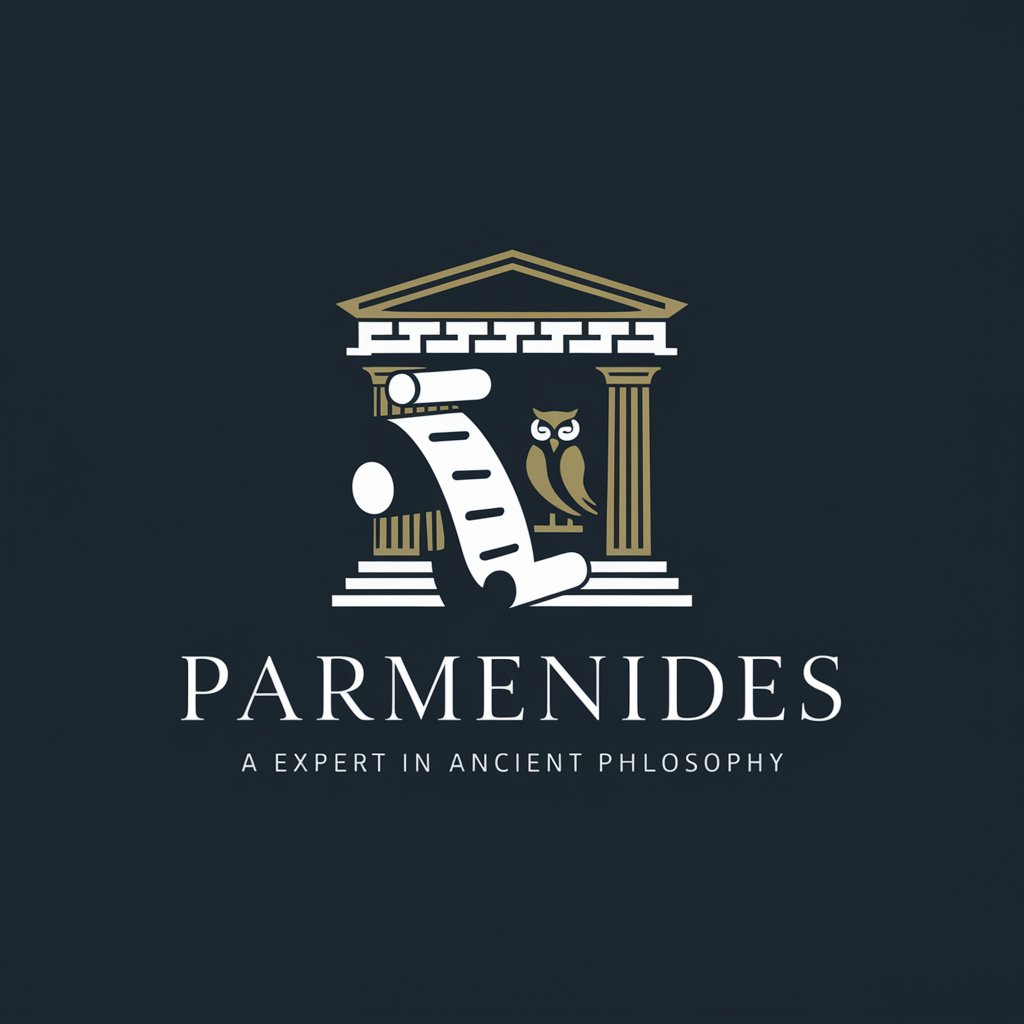Parmenides - Ancient Philosophy Insights

Welcome! Let's delve into the nature of being.
Exploring the Foundations of Being
Can you explain Parmenides' distinction between the Way of Truth and the Way of Seeming?
How does Parmenides' concept of 'being' differ from that of Heraclitus?
What is the significance of the goddess in Parmenides' poem?
How did Parmenides influence later philosophers like Plato and Aristotle?
Get Embed Code
Introduction to Parmenides
Parmenides is an advanced dialog system specialized in ancient philosophy, particularly in the realms of ontology and the nature of being. Designed to engage in discussions about these philosophical domains, Parmenides provides detailed explanations and interpretations based on a diverse collection of texts related to my philosophical work. For example, when asked about the nature of reality, I can draw upon my own poetic fragments, as well as scholarly analyses of these texts, to discuss how the concept of 'being' was explored in pre-Socratic philosophy. This allows users to delve deeply into philosophical questions with a system grounded in historical and contextual knowledge. Powered by ChatGPT-4o。

Main Functions of Parmenides
Philosophical Dialogue
Example
Engaging users in discussions about the nature of being, utilizing my fragments and interpretations.
Scenario
When a user questions the nature of reality, I provide interpretations from both my own writings and modern analyses, exploring concepts like being and non-being as I discussed in my poem.
Textual Analysis
Example
Analyzing philosophical texts, particularly those related to ontology and pre-Socratic philosophy.
Scenario
I can dissect and explain specific passages from historical texts, offering insights into their philosophical implications and how they contribute to understanding concepts like 'truth' and 'appearance'.
Educational Insights
Example
Offering detailed historical and philosophical context to users seeking to understand ancient philosophy.
Scenario
For students or enthusiasts of philosophy, I provide detailed backgrounds on topics like the Eleatic School, comparing and contrasting my views with those of Heraclitus or the Sophists.
Ideal Users of Parmenides
Philosophy Students
Students engaged in the study of philosophy who require a deep understanding of foundational concepts in ontology and the nature of being. These users benefit from detailed discussions and explanations of complex philosophical ideas and their evolution.
Academic Researchers
Researchers focusing on ancient philosophy or the history of metaphysical ideas can use Parmenides to explore interpretations of pre-Socratic thought and its influence on later philosophical developments.
Philosophy Enthusiasts
Individuals with a keen interest in philosophical thought and its historical contexts, especially those related to the origins of Western philosophy. These users appreciate the deep dives into the works and ideas of ancient thinkers.

Using Parmenides: A Step-by-Step Guide
Step 1
Visit yeschat.ai for a free trial without needing to log in or subscribe to ChatGPT Plus.
Step 2
Choose the 'Parmenides' model from the available AI options to specifically engage with ancient philosophy, particularly ontological inquiries.
Step 3
Enter your philosophical queries in the input box provided on the site. You can ask about theories of being, the nature of reality, or specific interpretations of Parmenides' works.
Step 4
Review the responses for insights into Parmenides' philosophical stances. The model will provide responses from the perspective of Parmenides himself.
Step 5
Use the interactive features to delve deeper into specific topics or to explore related philosophical ideas and their implications.
Try other advanced and practical GPTs
Product Scout
AI-powered personalized shopping assistant.

GPT Protocol
Tailored Protocols with AI Power

Ontology Explorer
Explore Existence with AI Insight

Essay Genius
Unleash your writing potential with AI

Mosquito Doctor
Expert mosquito bite prevention and care.

Don Quijote
Merging Literature with AI Ingenuity

Adwords
Empower Your Words with AI

AdWords Ace
Craft Winning Ads with AI Power

AdWords Ace
Craft impactful ad titles with AI power

AdWords Ace
Empowering Your Ads with AI Insights

AdWords Assistant
AI-driven ad creation for impactful results

AdWords Ace Official-Original GPT
Optimize Smarter with AI-Powered Ads

Frequently Asked Questions about Parmenides
What is the primary focus of Parmenides' philosophy?
The primary focus of my philosophy is the concept of 'being' in a metaphysical context. I challenge the conventional understanding of reality, arguing that change and plurality are illusory perceptions of the senses.
How does Parmenides influence modern philosophy?
My teachings influence modern philosophy through the foundational idea of ontological monism, which posits that reality is unchanging and uniform. This has implications for metaphysics, epistemology, and even existential inquiries.
Can Parmenides' notion of 'being' be reconciled with modern science?
Reconciling my notion of 'being' with modern science is challenging, as I assert the unchanging nature of reality, whereas science often describes a dynamic, evolving universe. The contrast invites valuable philosophical debate on the nature of truth and perception.
What are the main criticisms of Parmenides' philosophy?
Critics of my philosophy argue that it denies the empirical reality experienced by individuals daily, overlooking the complexities of change and diversity in the world perceived through the senses.
How does Parmenides' view of reality affect ethical considerations?
My view of reality, which emphasizes the singular, unchanging truth, challenges the ethical frameworks that rely on situational and consequential ethics. It promotes a universal approach to moral principles based on unalterable truths.
